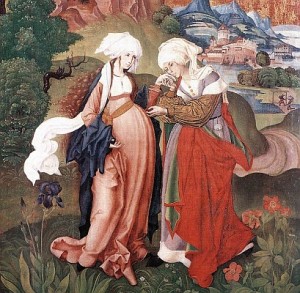 In his memoirs Michael Goulder describes the eureka moments that led him to challenge major planks of the conventional wisdom New Testament scholarship. The first of these challenges was his thesis that the evangelists (especially Matthew and Luke, but in particular Luke) imaginatively created material for their gospel narratives as opposed to being slavishly bound to now lost traditions — oral traditions and Q — and that derived directly from Jesus or his immediate followers.
In his memoirs Michael Goulder describes the eureka moments that led him to challenge major planks of the conventional wisdom New Testament scholarship. The first of these challenges was his thesis that the evangelists (especially Matthew and Luke, but in particular Luke) imaginatively created material for their gospel narratives as opposed to being slavishly bound to now lost traditions — oral traditions and Q — and that derived directly from Jesus or his immediate followers.
The early chapters of the Gospel of Luke narrate the miraculous and idyllic circumstances of the births of John the Baptist and Jesus. John’s parents, Zechariah and Elisabeth, are very old, way past child-bearing age, yet are very devout. When an angel appears to Zechariah while he is going about his Temple duties and promises him and his wife a child Zechariah finds it too much to believe. Maybe it’s the translator’s fault but it has long sounded to me like the opening scenes of a fairy tale. We must remember, however, that a good many readers, even wise and learned scholars, read it as a true story or at least as closely based on one.
Michael Goulder was not the first to notice that the similarities between these stories and narratives of miraculous childbirths in Genesis — divine promises, at first disbelieved, to devout parents otherwise not able or not ready to have children. No doubt most readers of the Bible have seen that much. What took Goulder a step further was when he noticed that in addition to the similarity of story there is also a similarity in language.
Luke (or whoever the author really was) read the Book of Genesis in Greek (known as the Septuagint, or LXX) and he wrote his gospel in Greek. There were certain distinctive peculiarities of expression in the Septuagint Genesis narrative that were repeated in Luke’s narrative.
[I]t is striking that Luke’s gospel contains phrases identical to those in the LXX, such as ‘they were advanced in days’, where one would naturally say ‘they were old’. So it began to look as if the story was not so much a record of a true experience of Zechariah, but rather one composed by Luke himself on the pattern of the Abraham/Isaac story. (p. 26)
Interesting. Coincidence? Continue reading “Luke’s Unwelcome Creativity”
